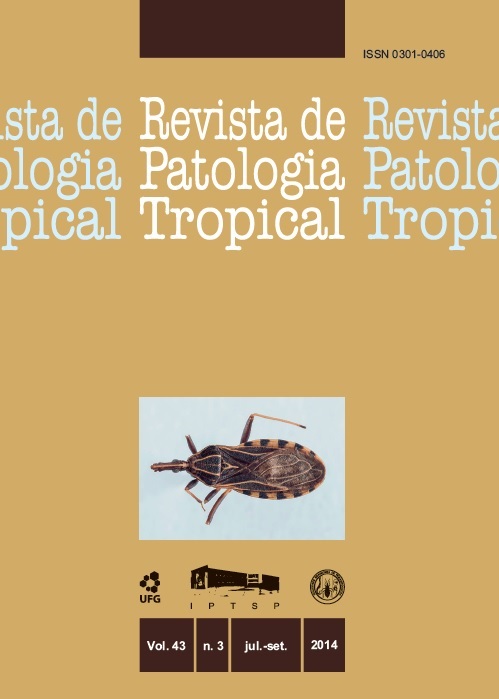INTESTINAL PARASITES IN VEGETABLES COMMERCIALIZED IN MARKETS FROM FEDERAL DISTRICT, BRAZIL
DOI:
https://doi.org/10.5216/rpt.v43i3.32216Keywords:
Vegetables, protozoan, helminthes, enteroparasitesAbstract
Parasitic infections occur due to poor sanitary conditions and hygiene habits. Vegetables sold in open markets may pose a risk to public health because they are eaten raw by the population and eventually be contaminated with protozoan cysts, eggs and/or larvae of helminthes parasites. In order to describe the occurrence of these parasites in vegetables sold in open markets, samples of watercress (Nasturtium officinale R. Br), lettuce (Lactuca sativa L.) and arugula (Eruca sativa Mill), ten administrative regions of the Federal District of Brazil were analyzed between February and April 2013, using the method of sedimentation. It was observed that all open markets sold vegetables contaminated by some organism (protozoans, helminthes and/or arthropods). The intestinal parasites detected were Entamoeba sp., E. coli, Strongyloides sp. Ascaris sp, Enterobius vermicularis and Ancylostomidae. It is concluded that vegetables sold in the open markets of the Federal District of Brazil may facilitate the transmission of intestinal parasites if not properly sanitized.
Downloads
Downloads
Published
How to Cite
Issue
Section
License
The manuscript submission must be accompanied by a letter signed by all authors stating the full name and email address, confirming that the material has not been published or is under consideration for publication elsewhere, and agreeing to transfer copyright in all media and formats for Journal of Tropical Pathology. The authors will not be paid for published articles. They are solely responsible for the content of those articles, even if the Editor holds the right to adjust them to the norms of the journal.
The reviewers will not be paid for the peer review process.

